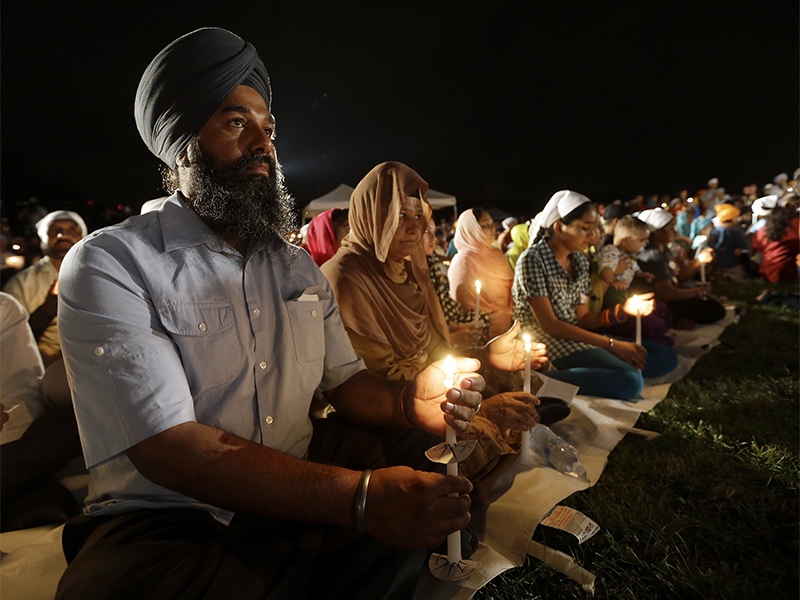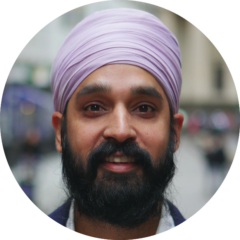(RNS) — Not so long ago, when I spoke to audiences outside of my home turf of academia, I felt uncomfortable naming whiteness and white supremacy. I worried that people would not understand the terms or that I would be seen as too radical in my politics.
A lot has changed, however, in the past five years. We have witnessed major shift in our awareness of white supremacy, an ideology that has permeated our consciousnesses and structures for centuries — and one that continues to bear influence on every aspect of our lives. We have all come to internalize white supremacist outlooks, from our whitewashed standards for beauty, to our assumptions about whom to consider as authority figures, to the biases we carry on whom to fear and whom to trust.
Supremacy is all around us, and we should not be afraid to talk about the different kinds of supremacy in our culture. Supremacy is nothing more than thinking we are better than others on the basis of certain aspects of our identities (or theirs). White supremacy refers to the racialized perceptions that govern how we classify people and respond to them. Male supremacy refers to how gender norms lead to situations in which masculinity is privileged and misogyny is normalized.
We may be acquainted with some supremacies more than others. A white person may fail to see how white supremacy works because its effects are not as obvious as they are to those who suffer them. Women might be more aware of male supremacy than men because they deal with patriarchy everyday.
Supremacy is not just a personal feeling; it finds its way into our institutions and ways of doing business. It shows up in data. We need look no further than the wage gap across genders to see how supremacist outlooks are normalized and institutionalized.
I want to talk about another form of supremacy that we don’t often discuss as such but observe all around us: religious supremacy.
As I see it, religious supremacy is the idea that “I am better than you on the basis of my religious practice.”
There are many reasons people give when they claim their religion has exclusive access to the truth. And there are many people, from all different backgrounds and traditions, who believe they are superior to the people around them.

White supremacy demonstrators clash with counterdemonstrators at the entrance to Lee Park in Charlottesville, Va., on Aug. 12, 2017. (AP Photo/Steve Helber)
As history has shown, any form of supremacy poses a threat to our society. Religious supremacy is no different. The moment you see yourself as better than the people around you, you begin to see them as deficient, and, as time goes on, inhuman. Before you know it, you have justified mistreating the people around you on the basis of these perceptions.
We have seen this cycle repeat itself time and time again. The impulse that animated the worst violence our world has seen — including chattel slavery, violent conquest and ethnic genocide — is the same impulse that we’re seeing around the world today, whether through Christian supremacist outlooks in white nationalist circles, Hindu supremacist attitudes governing India today or Muslim supremacist views that breathe life into groups like ISIS.
In the Western context, the most noticeable form of religious supremacy is that of evangelism. It’s so embedded within our culture that we have normalized it; most of us don’t even think of it as a form of religious supremacy.
Many of us don’t see evangelism as religious supremacy because it doesn’t necessarily look like a problem. It can feel to the evangelist like a wish to share the joy in one’s faith. This is why new converts can be the most ardent evangelists: They carry newfound conviction that feels better than what they knew previously, and they want everyone to have it.
This may seem innocuous on its face. “What’s wrong with sharing something that I think can help you?”
My honest answer: If this were how it played out in reality, I wouldn’t mind so much.
But evangelism is nothing more than a religious supremacist wolf in sheep’s clothing. The logic of evangelism requires one person to perceive the other — and that person’s faith — as misguided, inferior and in need of saving.
Historically, and even today, the “gift” of salvation has been weaponized time and time again to justify intervention and conquest. It becomes less about offering an alternative view and more about coercing another into accepting yours. Settler colonialism was fueled by this mindset. The forced conversions, violent conquest and genocide against indigenous peoples throughout the Americas over the past five centuries have been motivated in part by the notion of religious supremacy.
As we know, the world is constantly engaged in a struggle for power, and it is those with less power who end up in compromised positions and, ultimately, harmed through these uneven exchanges.

An open Bible sits on a map. Photo courtesy of Creative Commons
Theorist Johan Galtung would refer to our situation as one of cultural violence: norms that allow direct and structural forms of violence to seem acceptable. This is how white supremacy’s racism becomes so deeply entrenched in our institutions and structures. It is the norm of criminalization of black bodies that leads to slavery, Jim Crow laws, racial profiling, police brutality and mass incarceration of black Americans.
The idea of cultural violence also helps explain why so many of us have accepted the idea of evangelism without batting an eye. It only seems normal and acceptable because we’ve been socialized to view it as normal and acceptable.
I think this is what people mean when they contest the notion of “religious tolerance.” It’s common in religious contests for people to say that our goal should be to go beyond tolerance to come into a place where we fully respect and honor one another’s humanity.
But how can we do that if, at our core, we believe that others are inferior to us?
No community is untouched by the disease of religious supremacy that plagues our world. And these outlooks will continue to harm us all until and unless we are able to accept a new model.
Yet we all fall into this trap because we are unaware that we are even thinking this way. We don’t even know ourselves well enough to know what we believe, let alone think about the implications of our supremacist outlooks.
So where do we go from here? How do we begin to dismantle religious supremacy? And how do we hold our faith as true and worth believing while not thinking ourselves to be better than those who believe differently from us?
What we learn from other such decolonizing efforts is that we must begin with a double move that accounts for the reality that everything around us — including ourselves — has been colored by these outlooks.
With this in mind, we must do two things simultaneously: 1) Acknowledge its existence and, to the best of our abilities, understand how it shows up in our world; and 2) Go within ourselves and identify the ways in which we have been tainted by this toxic ideology.
It’s only once we take these two measures that we can begin to truly imagine what pluralism might look like.






